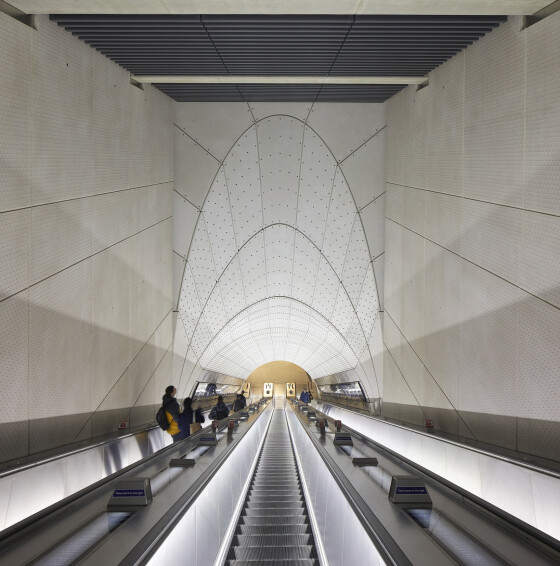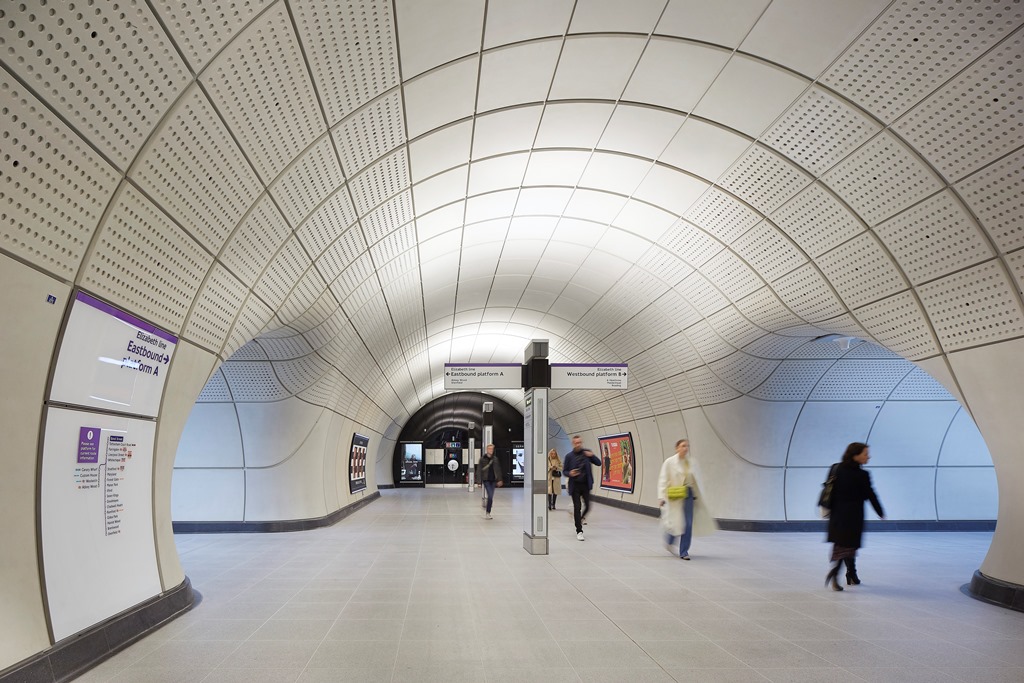Design of the Elizabeth Line is credited to Grimshaw, Maynard, Equation and AtkinsRéalis.
The line provides a direct east-west train service runs between Reading/Heathrow and Essex/southeast London.
The Stirling Prize, presented annually since 1996, exists to recognise the UK’s best new architecture.
Here is what RIBA’s publicity blurb said about the Elizabeth Line: “Its scheme-defining muted palette of perforated cladding, sensitive lighting and coherent wayfinding systems create an intuitive, frictionless experience.
“Curvaceous, fluid lines converge and diverge, carefully guiding passengers to flow around corners, down cavernous vaulted tunnels and onto wide, open platforms. The lighting subtly shifts between warmer and cooler tones to highlight different levels and junctures, with a warm, softly-diffused band of indirect lighting spanning the platforms above the train doors and direct, cool lighting in smaller cross-passages.
“The expansive tunnels and uncluttered double-length platforms – designed to accommodate full-size trains – feel generously spacious, while major features such as seating and freestanding ‘totem’ concourse signage made from screen-printed toughened glass are repeated from station-to station. The family of finishes give the whole network coherence, helping passengers to navigate the network with confidence.”
“The network is an exemplar of inclusive design, not only through the application of step-free access throughout, but through sensitive considerations to each sensory experience. Interventions such as hiding acoustic mats behind cladding to absorb excess noise, removing unnecessary fixtures and fittings and employing a restrained colour palette help to create a sense of calm for those who find underground travel overwhelming.

RIBA president and jury chair Muyiwa Oki said: “The Elizabeth Line is a triumph in architect-led collaboration, offering a flawless, efficient, beautifully choreographed solution to inner-city transport.
“It’s an uncluttered canvas that incorporates a slick suite of architectural components to create a consistent, line-wide identity – through which thousands of daily passengers navigate with ease.
“Descending into the colossal network of tunnels feels like entering a portal to the future, where the typical commuter chaos is transformed into an effortless experience. This is architecture of the digital age – a vast scheme that utilises cutting-edge technology to create distinctive spatial characteristics and experiences.”
![The Elizabeth Line [ © Hufton + Crow ] The Elizabeth Line [ © Hufton + Crow ]](https://www.theconstructionindex.co.uk/img-cache/450542733ee899a6b1fa668367c19b54/320x323.32315210751_1729144122_the-elizabeth-line-hufton-+-crow-original-4.jpg)

Grimshaw partner Neill McClements recognised the role of contractors on the project. “The Stirling Prize recognises all of the design and construction teams that have come together to make the project the success that it is.”
Declan O’Carroll, AtkinsRéalis UK architecture leader, said: “Projects such as this require a diverse range of skills and a collaborative partnership of creative talents to be brought together, and this has been an exemplary demonstration of that approach, creating a blueprint for future major infrastructure projects like this.”
Not everyone was impressed. Architect Ian Ritchie was quoted by The Times saying: “Surely the Elizabeth Line is engineering infrastructure. By all means give it to the engineers – that would show respect and help dissolve professional design apartheid – but it’s hardly evolutionary architecture.”

